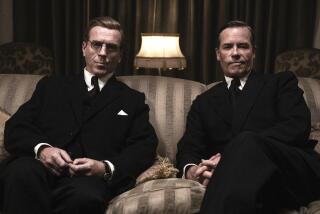Betrayed by Nicholas Bethell (Times Books: $15.95; 202 pp., illustrated)
- Share via
In the early years of the French Revolution, French royalist exiles talked the British government into bankrolling their plan for an amphibious landing in Brittany. Their countrymen, they claimed, would welcome them with open arms, rise up against the tyrannical new regime, and demand the restoration of the old monarchy. When they landed in 1794, some of the French did welcome the exiles, but more of them were very unfriendly indeed, and the campaign ended in disaster. This did not keep the British from trying again elsewhere, and with the same results.
So using exiles to overthrow unfriendly governments is an old story, and Nicholas Bethell’s “Betrayed” recounts an especially sorry chapter.
Americans have a hard time taking seriously a poor, small and faraway country that once had a king named Zog. Albania gets confused with the imaginary regimes the agents of “Mission: Impossible” used to subvert every week. But the attempt of British and American intelligence agencies to bring down Enver Hoxha’s Communist government was a serious, if bungled affair, in which many lives were lost and much was seen to be at stake.
For in the immediate postwar years, as the Soviet Union tightened its grip on Eastern Europe and threatened Western access to Berlin, Albania seemed a place where a counterblow could be struck against Stalin, and at relatively little expense. Tucked between Yugoslavia and Greece and looking across the Adriatic Sea at the heel of the Italian boot, Albania had a strategic importance disproportionate to its size. Or at least intelligence experts enamored of geopolitics thought it did.
Plenty of Albanian exiles were willing to put themselves in British and American pay in exchange for a chance to act against the Hoxha regime. Here’s where Bethell’s tale begins to sound familiar. For like many other exiles before them and since, the Albanians were divided by deep personal and ideological antagonisms; they vastly exaggerated the extent of the following they were likely to command, once they were in country; they badly underestimated the government’s hold on the Albanian people.
And like other exiles before them and since, they were ill-served by their paymasters. Nothing in their training prepared them to lead the hard life of the guerrilla.
Not only were the Albanians ill-served by their friends, Bethell charges, they were betrayed as well: betrayed in small part by their own loose talk, the common vice of exile movements, but betrayed especially by Kim Philby, the most notorious double agent of the postwar era. As British liaison with the Office for Policy Coordination (OPC), which had charge of the American side of the Albanian operation, Philby told the other side everything it needed to know. So when the exiles parachuted into the Albanian countryside, for instance, Hoxha’s men were waiting to gather them up, like pumpkins from a patch.
Philby’s treachery is hardly a revelation. He discusses his betrayal of the Albanians in his memoirs, and Bethell relies heavily on Philby’s account. Agencies of the U.S. government, according to Bethell, continue to refuse to acknowledge any U.S. participation in the attempt to overthrow Hoxha. But at least on the basis of his interviews with exiles (not always the most reliable sources, when scores still remain to be settled), and other participants, the garment of “plausible deniability” that the government continues to clutch about itself looks pretty threadbare.
Reading Bethell’s well-crafted narrative makes one doubt whether helping exiles overthrow the government of a small, poor and unfriendly country is really as easy as “falling off a log,” as one U.S. official was quoted as saying last summer.
More to Read
Sign up for our Book Club newsletter
Get the latest news, events and more from the Los Angeles Times Book Club, and help us get L.A. reading and talking.
You may occasionally receive promotional content from the Los Angeles Times.










